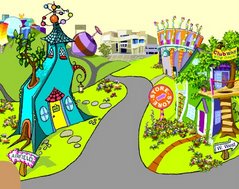Living and Learning on Whyville.net
Multiplayer games and worlds have increased in popularity with millions of players now spending dozens of hours or more online each week. We know surprisingly little about what younger players do in virtual worlds like Teen Second Life, Habbo Hotel, Club Penguin, Virtual Laguna Beach, There and others. Discussions about their promises and problems have been initiated among researchers, parents, developers, and policy makers. The purpose of this blog is to make our current research publicly available about one such teen virtual world called Whyville and to solicit feedback and initiate discussion.
Whyville.net currently has over 2 million registered players ages 8-16. In Whyville, teens are encouraged to play casual science games in order to earn a virtual salary in ‘clams’, which they can spend on buying and designing parts for their avatars, projectiles to throw at other users, and other goods. The general consensus among Whyvillians (the citizens of the virtual community of Whyville) is that earning a good salary and thus procuring a large number of clams to spend on face parts or other goods is essential for fully participating in the Whyville. Like other virtual worlds, hundreds of cheat sites have been developed outside of Whyville to reveal shortcuts and introduce new players to virtual customs.
Funded by the National Science Foundation, UCLA researcher Yasmin Kafai and her team study many different aspects of Whyville including science learning, avatar creation and virtual identity, the role of cheating, and flirting and dating through Whyville.
We have a couple of presentations at AERA this week, including hosting one symposium concerning methods, ethical issues, and findings from studying learning across spaces in people's lives.
Kafai, Y. B. & Fields, D. A. (2009, April). The development of participatory competencies in virtual worlds. Paper to be presented at the annual meeting of the American Educational Research Association, San Diego, CA.
Fields, D. A. (organizer), Kafai, Y.B. (chair), Jacobs, G., Steinkuehler, C., Duncan, S., King, E., Simkins, D., Fahser-Herro, D., Alagoz, E., Satwicz, T., Stevens, R., McCarthy, L., Giang, M., & Lam, E. (2009, April). Tracing learning across, within, and between ‘real’ and ‘virtual’ worlds: A discussion of methods, ethics, and findings. Symposium to be conducted at the annual meeting of the American Educational Research Association, San Diego, CA.


No comments:
Post a Comment